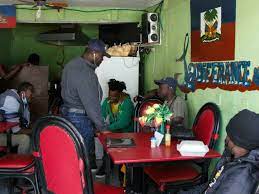They have been fleeing their country in crisis for several years. With each new wave of migration, thousands of Haitians leave their island in search of refuge. In recent months, many of them have crossed Central America in dire conditions to reach the US border through Mexico. Given the difficulties to reach the United States, some prefer to stay in Mexico, making Tijuana a “little Haiti.”
‘Little Haiti’ in Tijuana: the end of the journey for Haitian migrants?
Tijuana, December 15 (Radio France International).– In a small Haitian restaurant in downtown Tijuana, Michaela cooks traditional recipes from her native island based on rice, beans or chayotes.
At lunchtime, the place is full of Mexican customers, but also many Haitians. “I am proud, Haitians really like the food of our country,” says the cook. Mytherson Talleyrand has come to eat with friends and to enjoy the comfort of being with his compatriots.
“This place is a ‘little Haiti’ in Mexico. We happily meet to eat together. We found the same drinks, the same food. We are eating Haitian culture, ”he tells RFI.

In recent weeks, the center has hosted mainly Haitians who have arrived in Mexico after a long and difficult journey.
Mytherson Talleyrand arrived in Mexico just two months ago. After a stint in the capital, Mexico City, he moved to Tijuana with the hope of going to the United States. Before that, he lived in Chile for four years. He misses his country.
“It is my homeland, my homeland, the inheritance my ancestors left me… Honestly, if we had the economic possibility, the security in Haiti, everything a person needs to lead a normal life, we would not go to a foreign country to emigrate. “, Explain.

LESS PREJUDICE, LESS RACISM
About four thousand Haitians live in Tijuana. Their migration is fluctuating: many, like Jean-Louis Evins, arrived several years ago. This Haitian, who now regards Mexico as his own country, says that much of the former community has left Baja California for the United States in recent months. But he points out that a new wave of Haitian migrants has arrived from Latin America.
“Many Haitians are leaving Chile and Brazil. These are the ones we are receiving right now in Tijuana. The city suits them. There is less prejudice, less racism than in South America. It’s a bit quieter here. And there is also the American dream of going to live in the United States ”, he adds.
Jean Louis Evins works in an emergency medical center that offers free care to migrants and the poor. With so many Haitians, your job is to translate, but also to provide whatever support you can.
“I try to help. If I see that they have nowhere to sleep, I call to find a hotel for them. If I see that they don’t have clothes, I look for someone to bring them clothes… Because Haitians go through seven countries. And they come here without clothes, without shoes, without medicines ”, he enumerates.
FIND JOBS
This was the path Christian took, waiting outside the center to see a doctor for his back pain. He arrived in Tijuana two years ago after a long trip that still traumatizes him: “From Brazil, the trip was extremely difficult. The hardest part was the passage through the jungle between Panama and Costa Rica ”, he recalls.
The Haitian population continues to be very vulnerable on migratory routes and in Tijuana. Mylena Octave arrived a few months ago, also from Brazil. She has not seen her husband and daughter, who stayed in Haiti for four years. She has had a very bad time and, as a woman in Mexico, she half admits that every day is an ordeal: “It is very hard, but you have to do it. I can’t… I don’t want to talk to you about it! “
To earn some money, Mylena sells Haitian pastries on the street. A few days ago, he met Jeanne-Rose Noel, who had just arrived in Tijuana. “He came to talk to me because he couldn’t find a place to stay,” says Mylena Octave. “I lived alone in my flat, so she asked me to take her in. I agreed because we are Haitians. Now we are a family, ”he says.
From then on, the two women helped each other in their daily difficulties and never parted. Today, his priority is to obtain papers to find a job and send money to his relatives who are still in Haiti.

“We want to reunite with our family,” says Jeanne-Rose Noël, who has left her three daughters behind. Neither of them know if they will stay in Tijuana, but one thing is for sure: they cannot imagine ever returning to their home island. Still on the road, his dream is simple, explains Mylena Octave: “It is to keep fighting, to work to be a little bit happier one day. At the end of the day, that’s why we left our home. “
Source: rfi.fr, sinembargo.mx






